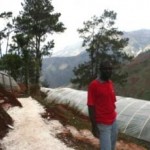
Michel Dorlean, a Haitian horticulturalist, grew up learning the family business of planting and growing flowers on hillside plots in his mountainous hometown of Furcy. Despite all the intensive work that goes into cultivating flowers, Dorlean and many other local flower producers struggled each year to reach their full earning potential. Today, thanks to assistance from Feed the Future, Dorlean is the president of a flower growers’ association in Furcy that generates US$18,000 per year. The project, implemented through USAID, is teaching smallholder farmers like Dorlean and his association how to use greenhouse agriculture to produce a higher quantity and quality of crops on smaller areas of land.

Orphan support is an important component of the USAID-funded Community HIV/AIDS Mobilization Program, known as CHAMP, which has, since 2009, delivered to nearly 8,000 orphans and vulnerable children a wide range of services such as education - school fees, life skills training through youth clubs, recreational activities, vocational training, emotional support, legal support - provision of birth certificates; referral of sick children to health facilities and follow-up home visits.

Haiti struggles to raise tax revenue. In fact, the country has one of the world’s lowest percentages of tax receipts as a share of GDP, at approximately 9 percent. This hinders the ability of municipalities to provide basic public services, such as waste management. With an expanded tax base, the Haitian Government seeks to improve the quality and scope of its services and decrease dependency on foreign aid.










Comment
Make a general inquiry or suggest an improvement.